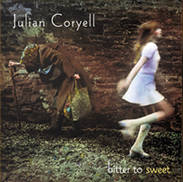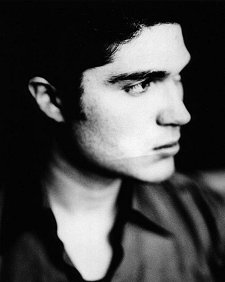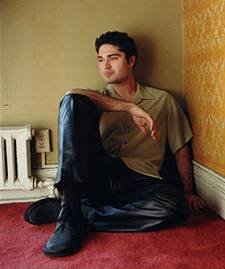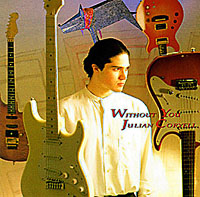INTERVIEW: Julian Coryell
Son of Famous Jazz Musician Cranks Out Pop-Rock (Mojo Records)
By: Alex Steininger

 Julian Coryell, son of jazz great Larry Coryell, has found his own musical path. Since the age of fourteen hes's been playing music live, often with his dad on "low key" gigs. But, recently he's found that the road to his true musical happiness is not being a studio musician, but creating his own music straight from his own experiences. The result of his new adventure is his debut on Mojo Records, BITTER TO SWEET.
Julian Coryell, son of jazz great Larry Coryell, has found his own musical path. Since the age of fourteen hes's been playing music live, often with his dad on "low key" gigs. But, recently he's found that the road to his true musical happiness is not being a studio musician, but creating his own music straight from his own experiences. The result of his new adventure is his debut on Mojo Records, BITTER TO SWEET.IMWT: Was it hard to find your own musical identity and get away from that of your dad's?
 Julian: Yeah, it definitely was. There was a lot of music around me; not just from my father, but from my mother as well. She was a music lover, musician, and a writer. So, there were a lot of choices. At my house, at any given time, we would listen to classical music, rock 'n' roll, country, opera, Broadway, whatever. I don't view it as a negative thing, but there was a lot of music for me to choose from. So, in that regard, it took me a long time to weed away the music that I wasn't so good at or as interested in.
Julian: Yeah, it definitely was. There was a lot of music around me; not just from my father, but from my mother as well. She was a music lover, musician, and a writer. So, there were a lot of choices. At my house, at any given time, we would listen to classical music, rock 'n' roll, country, opera, Broadway, whatever. I don't view it as a negative thing, but there was a lot of music for me to choose from. So, in that regard, it took me a long time to weed away the music that I wasn't so good at or as interested in.
IMWT: Do you ever find yourself playing other types of music besides pop, if only for your own enjoyment?
Julian: Sure. Generally, my only prejudice with music is that it is good. If it's good, I'll play it.
IMWT: Do you write other styles of songs that aren't for the public or aren't going to find there way onto your album, but are written purely as a release mechanism?
Julian: I do. I write some instrumental music still, which may actually see the light of day on some records I'll be recording in the next year or two. Some are jazz related and some are classically related. I'm always composing.
IMWT: Have you ever collaborated with your mom or dad?
Julian: I haven't collaborated proper with my mother or my father, but my dad and I are probably going to make an album in August, which will be an all acoustic album. Or, we may collaborate on this one. I'm not positive, but I think so.
IMWT: How does your dad react to your debut?
Julian: I think he likes it. I don't think he fully understands my stance in the music world yet; I don't think he appreciates it as art, per say. He just has respect for the work I do, but doesn't spend too much time getting into it.
IMWT: How did your deal with Mojo Records come about?
Julian: That's a pretty interesting story. I was a working guitar player in New York and I went out to Los Angeles to play on a friend's record. He was very supportive of the music I play and write and suggested I meet with some friends of his whom might be able to help me with my music that I sing. I didn't take it very seriously, but a few days later I was in a mutual friend's living room singing and playing my songs on an acoustic guitar and the president of Mojo just happened to be there. He showed up, liked what he heard, and a few weeks later we made the deal.
IMWT: How has the album been received so far in terms of college radio and the grassroots fan base?
 Julian: They've been pretty supportive. I try not to follow that stuff too closely, because you have expectations, and I think most artists' egos are bruised when the expectations aren't met. So, generally I don't delve into that too much. The basic response has been pretty positive and supportive.
Julian: They've been pretty supportive. I try not to follow that stuff too closely, because you have expectations, and I think most artists' egos are bruised when the expectations aren't met. So, generally I don't delve into that too much. The basic response has been pretty positive and supportive.
IMWT: Is Mojo supporting the album?
Julian: They seem to be. They seem to be, but you never really know. But, it seems they're very proud of the record and seem supportive of it as well.
IMWT: Before signing to Mojo did you consider their roster, past sales performances, and what they could do for you or did you just dive right into the deal?
Julian: Well, I never really thought I'd make public the music that we're discussing now. I always thought it would be something I would just play for my own private enjoyment and I would make my living either as a musician for other people or a producer for other people, or even outside of music. So, when Mojo made the offer I didn't go seek or talk to any other labels because it seemed so organic the way we got together. I wanted to trust that, you know?
IMWT: Are there any videos planned to support the album?
Julian: There are. We'll probably do a video for "Song for Cynics" and I'm not sure what the second video will be yet. But, right now we just want to play more live shows, get our name out there, and get the band tighter.
IMWT: What are your band goals for 1999?
Julian: I'd just like to share this music with people who want to hear it. So, if that's ten more people, that's cool. And if it's 10,000 more people, that would be great too. I just want to stay on the path that I'm on and not deviate from making really sincere records. We're also going to try and stay on the road for the rest of the year, but that ultimately depends on the success of the record and label support. But, if everything goes as planned, we'll be on the road for awhile.
IMWT: Is there any road experience that stands out in your mind -- either good or bad?
Julian: Yeah there is. We played Utah on the first tour and got booed off the stage. That stood out in my mind as a good and bad experience. Obviously, it was bad because we got booed off the stage, which is a drag, but the fact that we made people feel that threatened or confronted them with issues they weren't ready to be confronted with, there is something to be said about that. That definitely stands out.
IMWT: I'd imagine that had to be a very depressing night for you guys?
Julian: It was a pretty low point. We played after a young ska-punk band; it was nobody's fault. It was a bad booking. The audience was a ska-punk audience and they weren't prepared for what we do.
IMWT: What do you enjoy and hate about the music industry?
 Julian: I like the music industry when it is used as a vehicle to share your ideas and dreams with mass quantities of people. I can't think of anything more powerful and satisfying. That is when the machine works in your favor, which is very rare, I'm finding out. What I dislike most about the industry is its influence in dummying down the masses; in spoon feeding certain demographics; in limiting music and keeping the parameters on what can be successful very narrow. I think that, more than anything, is very infuriating to me. I think it is musical fascism. I see it as that, I really do. That would be my biggest complaint about the music industry. There are a bunch of little things, but that is the thing that frightens me the most. The underbelly, though, is what is great about the music industry. The people that do it because they love it, both the artists and the people involved in the promotion, marketing, and sales of music. That is my greatest hope; that those people will rise to the top and have more say and control in a few years. So, the music industry will be a freer place. I think the big corporate labels know their days are numbered, so their grip is even tighter. And what that means to me is that in a few years it will be easier for anyone to make music and share it if they want to. Right now, though, it is a pretty scary time to try and express yourself honestly without any commercial content.
Julian: I like the music industry when it is used as a vehicle to share your ideas and dreams with mass quantities of people. I can't think of anything more powerful and satisfying. That is when the machine works in your favor, which is very rare, I'm finding out. What I dislike most about the industry is its influence in dummying down the masses; in spoon feeding certain demographics; in limiting music and keeping the parameters on what can be successful very narrow. I think that, more than anything, is very infuriating to me. I think it is musical fascism. I see it as that, I really do. That would be my biggest complaint about the music industry. There are a bunch of little things, but that is the thing that frightens me the most. The underbelly, though, is what is great about the music industry. The people that do it because they love it, both the artists and the people involved in the promotion, marketing, and sales of music. That is my greatest hope; that those people will rise to the top and have more say and control in a few years. So, the music industry will be a freer place. I think the big corporate labels know their days are numbered, so their grip is even tighter. And what that means to me is that in a few years it will be easier for anyone to make music and share it if they want to. Right now, though, it is a pretty scary time to try and express yourself honestly without any commercial content.
IMWT: When the big six consolidated to the big five, was anyone at Mojo affected, or did you ever feel that you were going to be dropped because of the big desire to downsize and maximize profits?
Julian: Yeah, of course. I mean, it delayed the release of this record six months. Ultimately it was best, because when the dust settled, and everything was in place, it was better for the record. There wasn't any big changes happening while the record was being released. It was frightening, though, because you didn't know if you were going to be dropped. We had just finished this album and we were so proud of it. And then to have the fact that you may be dropped looming over your head, that was very difficult.
IMWT: What are the highest and lowest points you've experienced so far as a musician?
 Julian: That's a good question. Well, the answer to both of those would be right now. On one hand I'm getting to share this music I've waited my whole life to make and share with people, but on the other hand I have these expectations that often fall short or aren't met. And, contending with that on a daily basis, the highs and lows, it's a very stark juxtaposition of sort of bliss and manic depression. At other points in my life I've struggled and look back and know I never want to be there again, but as far as my music controlling my emotional state, now is the best time and the hardest time.
Julian: That's a good question. Well, the answer to both of those would be right now. On one hand I'm getting to share this music I've waited my whole life to make and share with people, but on the other hand I have these expectations that often fall short or aren't met. And, contending with that on a daily basis, the highs and lows, it's a very stark juxtaposition of sort of bliss and manic depression. At other points in my life I've struggled and look back and know I never want to be there again, but as far as my music controlling my emotional state, now is the best time and the hardest time.
IMWT: What goes into good music making for you?
Julian: Having the experience to be sincere, starting with me, and going through my bad. Also having the audience being able to receive the music in a sincere way. That is probably the best possible circumstance I can imagine possible for my music and my happiness. And the worst would be when it feels like a job, and when you get the job feeling, it's a drag.
IMWT: What inspires you to write your songs?
Julian: Generally life experience. A lot of the subjects on the record that you have are issues from the past -- looking back and trying to get a perspective on what went wrong and what went right. I just write about what I know and what I observe, internally and externally. I'm also trying to keep the music from sounding naive in a contrived way. And, I want to benefit from having already made a record and having a little bit of experience with that now. I definitely want to write better songs in the future. Not commercial songs, but songs that are just straight from the heart. The truer the better for me.
IMWT: What do you want the listener to get out of the music?
Julian: Well, I want the listener to get out of the music what I get out of music, which is sometimes a break from their own pain and sometimes just blissful joy, shutting your mind off for a few minutes so you don't have to think for a few. And maybe they can relate to me so they know they're not so strange, because there is someone else out there that feels the same way they do and has gone through the same experiences as them. If this guy is singing about it, maybe I'm not so weird. But, if I don't touch someone on a level that deep, hopefully then they'll just enjoy it for its entertainment value. More than anything, though, I just want people to walk away from my music feeling something. I would be unsuccessful if someone listened to my record and just forgot about it.

